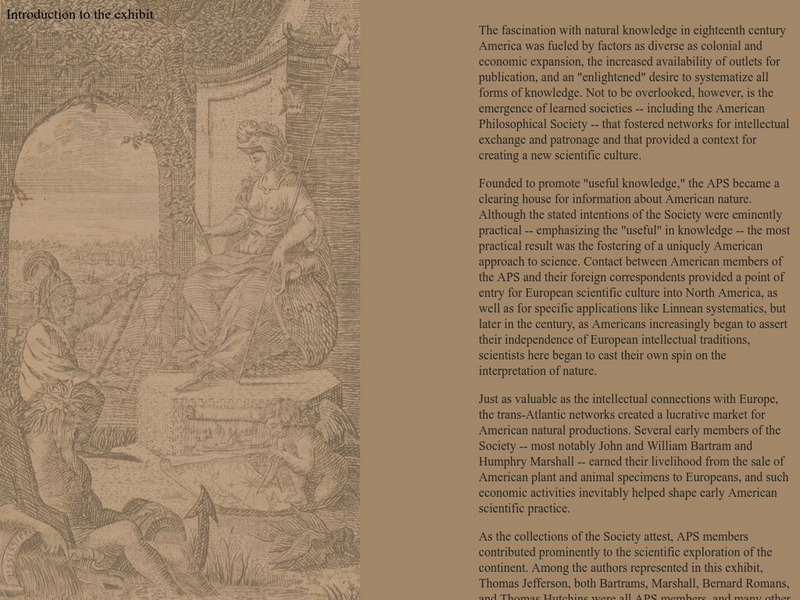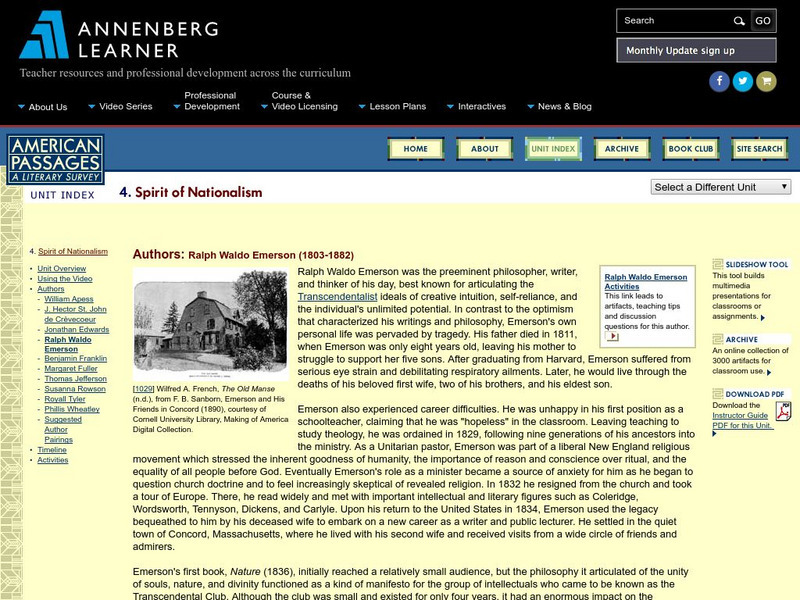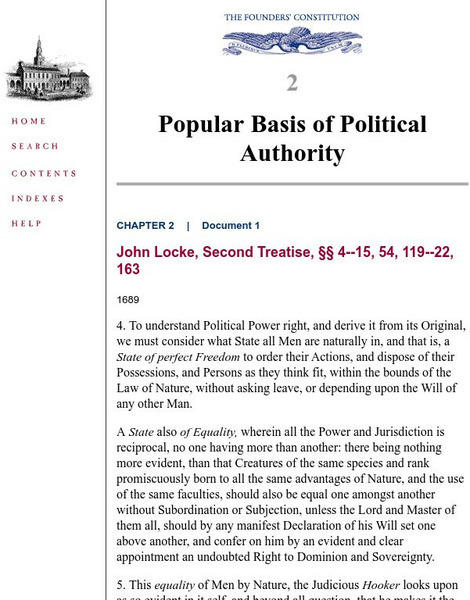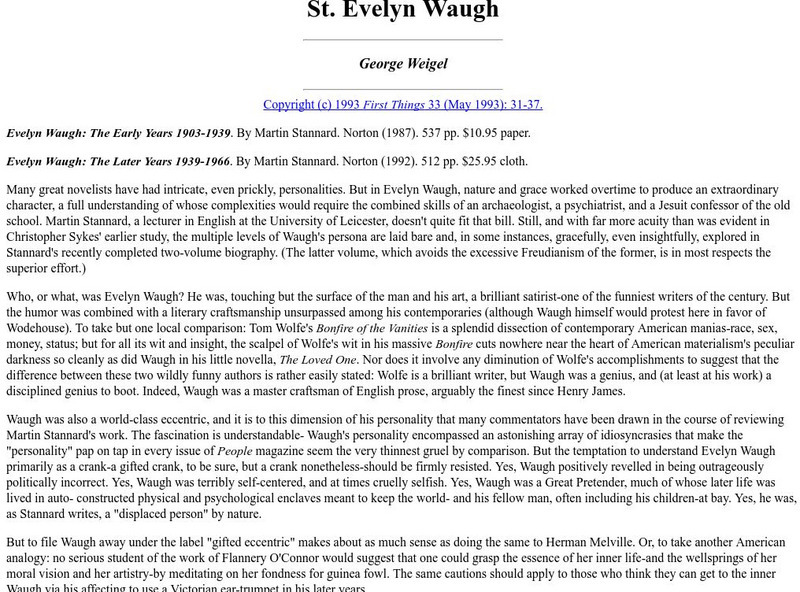Other
Southern Nature: Scientific Views of the Colonial American South
These colonial members of the American Philosophical Society explored the southern colonies. Here you will see what they found to be of scientific importance. There are accounts of indigenous people, flora, and animal species.
Annenberg Foundation
Annenberg Learner: American Passages: Spirit of Nationalism: Ralph Waldo Emerson
This features a brief biography of Ralph Waldo Emerson, an optimistic Transcendentalist author who's personal life was filled with tragedy. See "Ralph Waldo Emerson Activities" for related materials.
Stanford University
Coherence Theory of Truth:stanford Encycl. Of Philosophy
Clear, concise introduction to various coherence theories of truth. Author explains several versions of the theory, the arguments for and against them, while avoiding too much philosophical jargon. Includes bibliography.
University of St. Andrews (UK)
University of St. Andrews: Joseph Raphson
This University of St. Andrews page offers a good biography on Joseph Raphson, an English mathematician and philosopher(1648-1715.) Discusses his life and his contributions to these fields.
Internet Encyclopedia of Philosophy
Internet Encyclopedia of Philosophy: Ethics
This site from the Internet Encyclopedia of Philosophy gives a general introduction to the field of philosophical ethics. Divines moral philosophy into three main topics: metaethics, normative ethics, and applied ethics, including links...
University of Chicago
U. Of Chicago/ Popular Basis of Political Authority
Excerpts from John Locke's famous 1689 work "Two Treatises of Government" where he discusses his political ideas that came to influence the U.S. Revolutionaries.
Other
Elements of Metaphysics: Arguments for the Existence of God
Chapter from A.E. Taylor's book, "The Elements of Metaphysics," which looks at Kant's and Hume's philosophy.
Other
First Thing/ "St. Evelyn Waugh"/ Review of Biographies
This is an extended review of Martin Stannard's two volumes of Waugh's biography. Stannard contends that Waugh is "a brilliant satirest, one of the funniest writers of the century." The book and this review provide insight into Waugh's...
Project Gutenberg
Project Gutenberg: The Confessions of St. Augustine
The Confessions of St. Augustine by Bishop of Hippo Saint Augustine, translated by Edward Boverie Pusey, is offered in full text with bookmarking available, formatted for online reading.
Stanford University
Stanford Encyclopedia of Philosophy: Maimonides
A highly detailed biography of the famous Jewish philosopher and religious thinker. The article provides a thorough analysis of his religious ideas.
Stanford University
Stanford Encyclopedia of Philosophy: Divine Illumination
Excellent article from the Stanford Encyclopedia of Philosophy tracing the development of "divine illumination" throughout the classical and medieval Christian philosophical tradition. Describes how this distinctively Christian...
BBC
Bbc: Critics and Critiques of Athenian Democracy
Examine the different arguments for and against democracy by ancient Greek leaders and philosophers. The main critique of democracy came down to the question of whether we trust the masses to make informed decisions? Follow the rise and...
Stanford University
Stanford Encyclopedia of Philosophy: Saint Thomas Aquinas
This is a very detailed site about the life and the works of Saint Thomas Aquinas (1225-1274 CE). This site provides the reader with a brief biography, comparisons between Aristotle and Aquinas, commentary on Aquinas' work, and also a...
Gilder Lehrman Institute of American History
Gilder Lehrman Institute: History Now: Bartolome De Las Casas Debates the Subjugation of the Indians
[Free Registration/Login Required] Read a summary of Bartolome de Las Casas' views about the horrors of Spanish encomienda system and his arguments for proper treatment of Native Americans. Find a link to a translation of his book where...
Internet Encyclopedia of Philosophy
Internet Encyclopedia of Philosophy: Thomas Hobbes
This site from The Internet Encyclopedia of Philosophy provides a comprehensive survey of the life and philosophy of Thomas Hobbes. It discusses his writings as well as his ideas on moral and political philosophy.
Other
University of Miami: The Life of Buddha, Part I
A detailed account of the Buddha's life and teachings written from a philosophical perspective.
Internet Encyclopedia of Philosophy
Internet Encyclopedia of Philosophy: Nihilism
Excellent discussion from the Internet Encyclopedia of Philosophy of the history of nihilism in western philosophy and the main ideas associated with it. Although centering around Nietzsche's formulation, author does admirable job of...
TED Talks
Ted: Ted Ed: Who Am I? A Philosophical Inquiry
Throughout the history of mankind, the subject of identity has sent poets to the blank page, philosophers to the agora and seekers to the oracles. These murky waters of abstract thinking are tricky to navigate, so it's probably fitting...
Science Struck
Science Struck: Interesting Philosophical Questions About Time
Discover some of the deep questions that scientists and philosophers ask about time and some of the ideas that emerge from each one.
Khan Academy
Khan Academy: Philosophical Foundations of the American Revolution
A self-assessment of the philosophy of key figures during the American Revolution (1754-1800).
Khan Academy
Khan Academy: Wright of Derby, a Philosopher Lecturing on the Orrery
Joseph Wright of Derby's painting, "A Philosopher Lecturing on the Orrery", encapsulates in one moment the age of Enlightenment. View pictures and read details of this painting in this essay.
TED Talks
Ted: Ted Ed: Toward a Science of Simplicity
Simplicity: We know it when we see it- but what is it, exactly? In this funny, philosophical talk, George Whitesides chisels out an answer. [19:05]
TED Talks
Ted: Ted Ed: Making Sense of Irrational Numbers
Like many heroes of Greek myths, the philosopher Hippasus was rumored to have been mortally punished by the gods. But what was his crime? Did he murder guests or disrupt a sacred ritual? No, Hippasus's transgression was mathematically...
TED Talks
Ted: Ted Ed: Mysteries of Vernacular: X Ray
The story of the word X-Ray is one of great thinkers. French philosopher Rene Descartes isolated the letters X, Y and Z to stand for unknowns, and centuries later, Wilhelm Rontgen discovered the X-ray, using the X for the unknown nature...


















